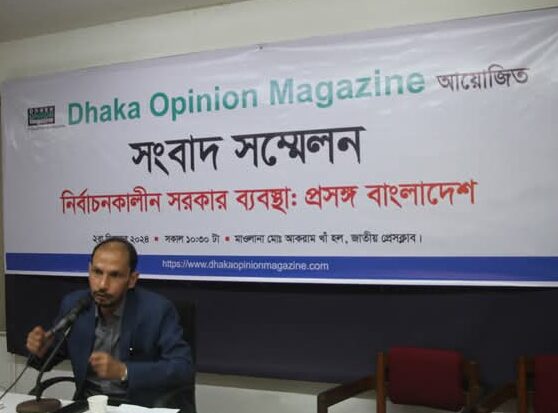Dhaka (December 02, 2024): Dhaka Opinion Magazine, a global/international opinion magazine, held a press conference on the ‘’Government System during Elections in Bangladesh’’ at the National Press Club, Dhaka, Bangladesh on December 2, 2024. The press conference, attended and addressed by Amir M Sayem, the Founder and Chief Editor of Dhaka Opinion Magazine, was held based on its publication on Contradictions over elections in Bangladesh and a possible Electoral Government and expressed views on a possible government system during elections in Bangladesh.
It is notable that Bangladesh has been undergoing serious political problems regarding the government system during elections for several decades. While many political parties prefer the party-in-power government system, many others prefer a non-party government system during elections for free, fair and credible elections. Thus far, eight elections were held under the party in power government system while four elections (the 1991 elections, the 1996 (June) elections, the 2001 elections and the 2008 elections) were held under the non-party caretaker government system in Bangladesh. But the political problem regarding the government system during elections has not yet been resolved. Amidst this background, Dhaka Opinion Magazine arranged a press conference on a more acceptable Electoral Government in Bangladesh.
The founder and chief editor of Dhaka Opinion Magazine says in the press a synthesis is developed to solve the electoral contradictions between the thesis (the party-in-power government) and antithesis (non-party caretaker government) based on analysis that was based on five criteria such as the functioning of the government during elections, the functioning of the electoral management bodies (such as the EC), foreign electoral intervention electoral participation and electoral competition can help solve the electoral problem. Of the party government and non-party government, the non-party government is better in holding elections in Bangladesh. But both governments are one-sided and flawed and are unable to desirably hold free, fair and credible elections always and can resort to absolutism due to the absence of checks and balances. Based on the loopholes and positive sides of both systems, a synthesis was developed by analysis and a government was proposed reflecting the synthesis.
Chief Editor Amir M Sayem proposed a government system called the Electoral Government that comprises a non-party Chief Advisor, a few publicly acceptable political leaders as advisors (one-third) from major political parties and a number of publicly acceptable non-political advisors (two-thirds). In the proposed system, major political parties and the proportion of their leaders as advisors may be sorted out based on the proportional number of seats in the parliament or the average percentage of votes obtained in all earlier general elections (e.g., 15-20 percent or any other reasonable percentage). The number of ministers and advisors may be 10-12 or more. The parliament will be dissolved, the government will leave office and a non-party Chief Advisor will be the head of the government. The President and Chief Advisor will recruit a few publicly acceptable non-party advisors in consultation with a few minor political parties (selected on the basis of a certain percentage of votes or any other reasonable means) or all other political parties that will have no representation of ministers in the Electoral Government.
The Founder and Chief Editor of Dhaka Opinion Magazine further says that the proposed electoral government, can function in a neutral manner, provide needed support the EMBs without party influence, reduce foreign electoral intervention, lead to electoral participation and ensure fair electoral competition among the parties or candidates more than any other form of government during elections, leading to free, fair and credible elections. This proposed government can be politically visionary in the sense that it can also generate the culture of political cooperation, which is lacking in Bangladesh, among parties in the long run.
But Amir M Sayem also says in the press conference that a direct referendum can be carried out to identify the people’s chosen reasonable electoral government system. Given that political parties failed to resolve the problem regarding the government system during elections and people are deprived of their voting rights, they can be included in the resolution of the contradiction between the party-in-power government and non-party government.
The Chief Editor further says that another form of government that is comprised of a non-party Chief Advisor may be the head of the government, a number of non-political advisors (half of the advisors) preferred by major political parties and a few publicly acceptable non-party advisors (another half), preferred by the President and Chief Advisor, based on the consultation with minor parties may also be taken into consideration in the referendum.
It is further notable that the Chief Editor says that the Chief Advisor needs not to be necessarily a retired judge. Any person including a retired chief justice, academician or any other eminent citizens can be a Chief Advisor. But the detailed rules and obligations are needed to make the Electoral Government as flawless as possible.
NB: Dhaka Opinion Magazine does not publish press release from others. It publishes its own press release. But other media/media outlets are encouraged to publish or disseminate DOM’s Press Release.

